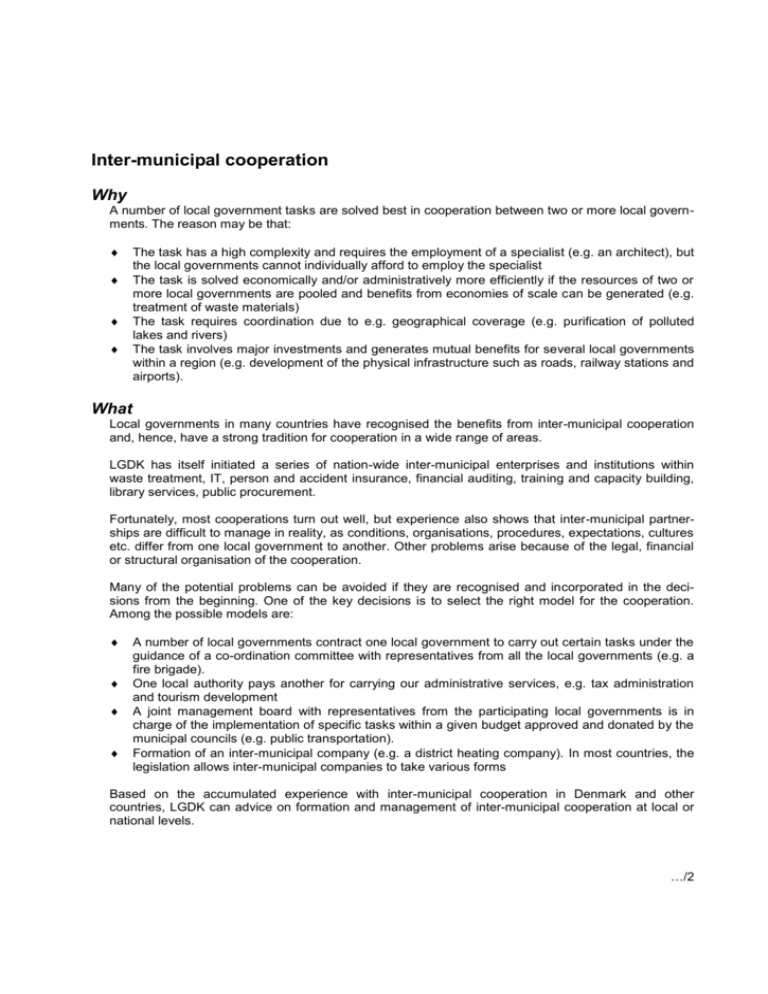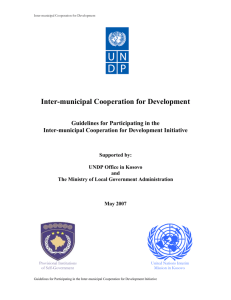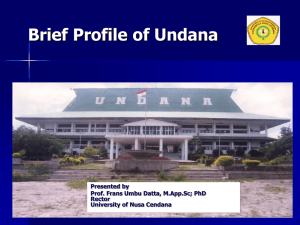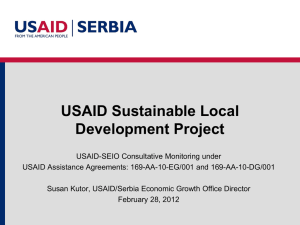Inter-municipal cooperation
advertisement

Inter-municipal cooperation Why A number of local government tasks are solved best in cooperation between two or more local governments. The reason may be that: The task has a high complexity and requires the employment of a specialist (e.g. an architect), but the local governments cannot individually afford to employ the specialist The task is solved economically and/or administratively more efficiently if the resources of two or more local governments are pooled and benefits from economies of scale can be generated (e.g. treatment of waste materials) The task requires coordination due to e.g. geographical coverage (e.g. purification of polluted lakes and rivers) The task involves major investments and generates mutual benefits for several local governments within a region (e.g. development of the physical infrastructure such as roads, railway stations and airports). What Local governments in many countries have recognised the benefits from inter-municipal cooperation and, hence, have a strong tradition for cooperation in a wide range of areas. LGDK has itself initiated a series of nation-wide inter-municipal enterprises and institutions within waste treatment, IT, person and accident insurance, financial auditing, training and capacity building, library services, public procurement. Fortunately, most cooperations turn out well, but experience also shows that inter-municipal partnerships are difficult to manage in reality, as conditions, organisations, procedures, expectations, cultures etc. differ from one local government to another. Other problems arise because of the legal, financial or structural organisation of the cooperation. Many of the potential problems can be avoided if they are recognised and incorporated in the decisions from the beginning. One of the key decisions is to select the right model for the cooperation. Among the possible models are: A number of local governments contract one local government to carry out certain tasks under the guidance of a co-ordination committee with representatives from all the local governments (e.g. a fire brigade). One local authority pays another for carrying our administrative services, e.g. tax administration and tourism development A joint management board with representatives from the participating local governments is in charge of the implementation of specific tasks within a given budget approved and donated by the municipal councils (e.g. public transportation). Formation of an inter-municipal company (e.g. a district heating company). In most countries, the legislation allows inter-municipal companies to take various forms Based on the accumulated experience with inter-municipal cooperation in Denmark and other countries, LGDK can advice on formation and management of inter-municipal cooperation at local or national levels. …/2 How Depending on the local conditions and the existing knowledge, support to inter-municipal cooperations will usually include some of the following elements: Survey of possible cooperation areas Drafting options for inter-municipal cooperation areas and models, introducing different models of finance and management Advice on the management in the initial stages of an inter-municipal cooperation Advice on drafting legal statutes for inter-municipal cooperation Study tour to Denmark in order to view and exchange experience on different models of inter-municipal cooperation A brief illustration LGDK has assisted in various projects regarding inter-municipal cooperation in Latvia, such as: Investigation of the inter-municipal cooperations in the Madona Region, with the objectives to: - evaluate and advise on the development of the already existing inter-municipal cooperations in the region - explore new possibilities for inter-municipal cooperation - investigate the relation between inter-municipal cooperation and local government territorial reform as perceived by the representatives of the local governments Assisting in the elaboration of the “Handbook in inter-municipal cooperation”, by proposing a structure of the handbook, writing selected chapters and advising a working group created to elaborate the handbook. The handbook included chapters on: - Organisational aspects of inter-municipal cooperations - Legal aspects of inter-municipal cooperations - Descriptions of specific inter-municipal cooperations in Latvia and abroad In the Russian Federation, LGDK has assisted a Centre for Innovation (under the Congress of Local Authorities in the RF) in developing consultancy services to local authorities within development of inter-municipal cooperation. As a basis for this, an analysis of the possibilities for different forms of inter-municipal cooperation was implemented, pinpointing possibilities and problems for this in the Russian Federation. Such an analysis was also carried out in Pskov Oblast administration specifically. In both cases, written analytical reports have been used for training on establishment of inter-municipal cooperations.






